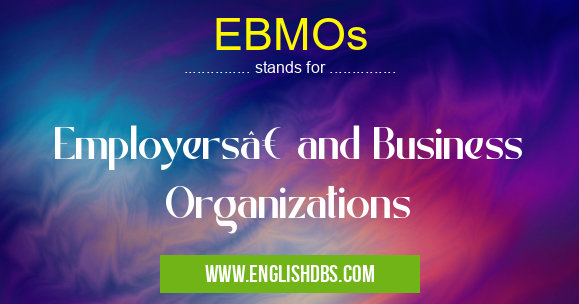What does EBMOS mean in UNITED NATIONS
EBMOs stands for Employers' and Business Organizations. They represent the interests of employers and businesses in governmental and legislative matters. EBMOs play a vital role in shaping policies and regulations that affect the business community.

EBMOs meaning in United Nations in Governmental
EBMOs mostly used in an acronym United Nations in Category Governmental that means Employers’ and Business Organizations
Shorthand: EBMOs,
Full Form: Employers’ and Business Organizations
For more information of "Employers’ and Business Organizations", see the section below.
Definition of EBMOs
EBMOs are organizations that represent the interests of employers and businesses in the public policy arena. They provide members with a platform to voice their concerns and advocate for policies that support their interests.
Functions of EBMOs
EBMOs perform a range of functions, including:
- Advocacy: Representing the interests of employers and businesses to government officials and policymakers.
- Education: Providing members with information on relevant laws, regulations, and policies.
- Networking: Facilitating connections between employers and businesses, as well as with government officials.
- Research: Conducting research and analysis on issues affecting the business community.
- Lobbying: Engaging in direct contact with policymakers to influence legislation and regulations.
Types of EBMOs
There are various types of EBMOs, each representing specific industries or sectors. Some common types include:
- Chambers of Commerce
- Industry Associations
- Trade Groups
- Business Councils
Benefits of EBMO Membership
Membership in an EBMO offers numerous benefits, such as:
- Access to expert advice and resources
- Opportunities for networking and collaboration
- A voice in shaping public policy
- Advocacy for the interests of employers and businesses
Essential Questions and Answers on Employers’ and Business Organizations in "GOVERNMENTAL»UN"
What are Employers' and Business Organizations (EBMOs)?
EBMOs represent the interests of employers and businesses in various sectors and industries. They advocate for policies and regulations that support economic growth, job creation, and a favorable business environment.
What are the key functions of EBMOs?
EBMOs typically engage in the following activities:
- Advocating for policies that promote economic growth and business development.
- Providing information and resources to members on industry trends, labor laws, and best practices.
- Negotiating collective bargaining agreements with unions.
- Participating in government consultations and providing input on regulatory frameworks.
- Promoting ethical business practices and corporate social responsibility.
What are the benefits of membership in an EBMO?
Membership in an EBMO can provide businesses with a range of benefits, including:
- Access to exclusive information and resources on industry trends and best practices.
- Opportunities for networking and collaboration with other businesses in the same sector.
- Representation in government consultations and policy negotiations.
- Support in navigating complex labor laws and regulations.
- Advocacy for policies that support the growth and success of businesses.
How can businesses join an EBMO?
The requirements for joining an EBMO may vary depending on the organization. Typically, businesses can join by submitting an application and paying an annual membership fee. Some EBMOs may have additional criteria for membership, such as specific industry affiliation or size requirements.
What is the role of EBMOs in labor relations?
EBMOs play a significant role in labor relations by representing the interests of employers in collective bargaining negotiations. They work to ensure that labor agreements are fair and equitable, while also supporting the competitiveness and productivity of businesses.
Final Words: EBMOs are essential organizations that represent the interests of employers and businesses in the governmental and legislative process. They play a vital role in ensuring that the voice of the business community is heard and that policies and regulations are shaped with the interests of businesses in mind. By advocating for sound public policy, EBMOs contribute to a strong and vibrant business environment.
